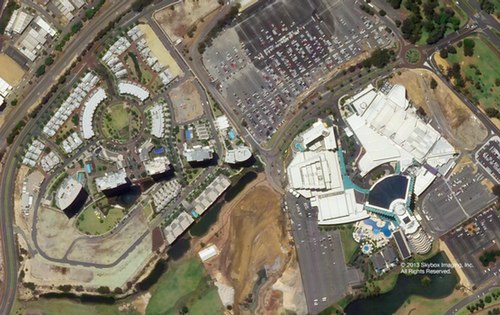
An image of the Crown Perth entertainment complex in Perth, Australia, taken by the SkySat-1 spacecraft shortly after its launch last year. (credit: Skybox Imaging)
After months of rumors, Google made it official Tuesday: they are acquiring commercial satellite remote sensing company Skybox Imaging for $500 million in cash. “Skybox’s satellites will help keep Google Maps accurate with up-to-date imagery,” Google noted in a brief press release about the acquisition. “Over time, we also hope that Skybox’s team and technology will be able to help improve Internet access and disaster relief — areas Google has long been interested in.”
Skybox was a little more effusive in its announcement. “The time is right to join a company who can challenge us to think even bigger and bolder, and who can support us in accelerating our ambitious vision,” the company explained. “Skybox and Google share more than just a zip code. We both believe in making information (especially accurate geospatial information) accessible and useful.” (The “zip code” refers to the fact that Skybox’s headquarters in Mountain View, California, is just a few kilometers away from Google’s own headquarters, the “Googleplex.”)
Google had been rumored for at least the last two months to be interested in acquiring Skybox. The deal made sense for both companies. For Google, it will get access to frequently-updated high resolution imagery for use in its Google Maps and Google Earth products, and perhaps elsewhere. Moreover, Skybox’s satellite technology could be repurposed for other applications, such as broadband Internet service, an area Google is reportedly interested in pursuing.
For Skybox, it will have an owner with deep pockets to help fund the development of its planned satellite constellation. Skybox has one satellite in orbit and a second awaiting launch, but has contracts with Space Systems Loral to build a constellation of at least a dozen satellites and with Orbital Sciences to launch them. While Skybox has raised more than $90 million from venture capital firms, it likely would have needed significantly more to deploy its satellite constellation. That may explain why Google picked up Skybox for “only” $500 million after earlier rumors that valued the company at $1 billion or more.
One area to watch is how this deal affects other companies planning constellations of smaller commercial remote sensing satellites. Planet Labs, which has already deployed more than two dozen CubeSat-class spacecraft to provide medium-resolution images, has raised more than $60 million from VCs to fund its development. In addition, there have been some new ventures announced just in the past month, by Dauria Aerospace and OmniEarth, to deploy constellations of remote sensing satellites.

and also I read here that they are investing more than $1bn to place more than hundred satellites in orbit to widen internet access …. and I am happy for google to acquire Skybox imaging which launched the world’s smallest high-resolution imaging satellite that collects images and video every day ….